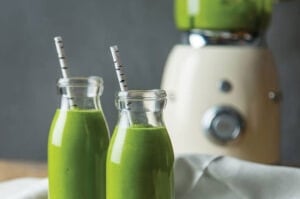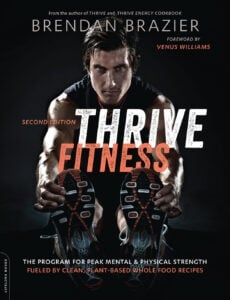
Can you really control your body’s chemistry? To a certain extent, yes. Here’s what you need to know.
I’ve come to learn that there’s more to being a successful athlete than simply eating and exercising—calories in, calories out. There has to be purpose with both. We also need to understand how food and fitness impact the hormonal system—and the value that comes with working this system to our advantage.
In my first book, Thrive: The Vegan Nutrition Guide to Optimal Performance in Sports and Life, I discuss the destructive nature of chronically elevated cortisol levels, which are caused by stress. The first instance of elevated cortisol actually provides a surge of energy and increased strength. However, soon after, if cortisol becomes chronically elevated, it turns catabolic, meaning that it will eat away at muscle and cause body fat to be stored.
Clearly, this needs to be understood when building a fitness program. Natural hormone manipulation can have a significant impact on results. Of course, we want to encourage our bodies to make less cortisol and more human growth hormone (HGH). After about age 30, our bodies naturally slow the production of HGH, which can lead to lean muscle loss, stored body fat, weaker bones, hair loss and other general signs of aging, including slower recovery between workouts and decreased range of motion.
Fortunately, it’s possible to increase your HGH production. Here are eight natural ways to maximize your workout and nutrition results by hacking your hormones.
1. Perform VO2 max training.
Training above your anaerobic threshold (the point during an intense workout when you’re feeling the “burn”) for short bursts engages fast-twitch muscles and helps produce HGH. This is known as VO2 max training. Using your largest muscles, like glutes and quads, to lift heavy weight will also release HGH. Squats and one-legged pistol squats—see below for a pistol squat how-to—are integral parts of the hormonal manipulation utilized by my Thrive Fitness training plan.
Pistol squats

- Standing on one leg, extend the other straight out in front of you.
- Grab your extended foot with the same-side hand, if you can. If your flexibility doesn’t allow you to grab your foot, hold your calf.
- Using a wall for balance and assistance, if needed, slowly lower yourself down until you’re hovering just above your grounded foot. Pause for one second.
- Slowly lift yourself up, back to starting position. Perform 20 reps. As your leg fatigues, use a wall for greater assistance. Repeat with your other leg.
Tip: Make it easier
Instead of straightening the extended, non-working leg, bend it at a 45-degree angle. Only lower yourself to a 90-degree angle, and then stand up.
2. Choose a 4:1 carb-to-protein recovery drink.
Consuming carbs without protein may inhibit HGH from being produced and therefore slow recovery rate. Within about 20 minutes of working out, drink a mixture that’s made up of a 4:1 carb-to-protein ratio. The carbs will help restock your muscle glycogen stores, and the protein will prevent your insulin from spiking.
3. Eat foods that contain L-glutamine.
Eating foods rich in the amino acid L-glutamine soon after a workout and before bed will also assist your body’s HGH production. L-glutamine is a nonessential amino acid, meaning the body can generate an adequate amount; however, L-glutamine stores become depleted when the body is under stress. Whether the stress is mental, emotional or physical (as a result of exercise, for example), L-glutamine levels are likely to be lower than ideal unless stress-supporting foods are a regular part of your diet. Pea protein and spinach are good sources of L-glutamine.
4. Spend time outside.
Vitamin D, which comes primarily from the sun, may help your body produce more HGH. Even getting 30 minutes of sun exposure a day can have a positive impact (just be careful not to get sunburned). Given that about 42 percent of Americans are deficient in vitamin D, you can probably benefit from taking a supplement too. Choose one that gives you at least 1,000 IU of vitamin D3.
5. Increase melatonin production before bed.
Increased melatonin levels have been shown to boost HGH levels. The best way to elevate melatonin is to avoid your TV, computer and phone for about an hour before bed. Melatonin is naturally produced in readying your body for a deep sleep, but if there’s too much light entering your eyes, its production won’t ramp up.
Still can\’t sleep?
Consider natural sleep aids like melatonin supplements, which may help you fall asleep faster. Magnesium also plays a key role in sleep, and even a minor lack of this mineral can keep you up at night.
6. Consume protein before bed.
Consuming high-quality, complete protein before bed may boost HGH. Plant-based protein in liquid form is ideal, as it’s easier to digest and keeps inflammation down. Also, foods like almonds, lentils and pea protein have been shown to help the body naturally produce gamma-aminobutyric acid (GABA), which helps you relax before bed and increases HGH production. (See the smoothie recipe below.)
 Pre-sleep HGH-Releasing Smoothie
Pre-sleep HGH-Releasing Smoothie
Serves 1
- 1 handful of spinach
- ¼ cup pine nuts
- ¼ cup walnuts
- 1 – 2 in piece cucumber
- 1 – 2 in piece celery
- Juice from ½ lemon
- ½ tsp grated fresh ginger
- 1 scoop of Vega Protein & Greens (Natural Flavor)
- ¾ cup water
Blend all ingredients together in blender.
In each delicious serving: 542 calories | 31 g protein | 42 g fat | 17 g carbs (6 g sugar, 6 g fiber) | 230 mg sodium
7. Eat foods rich in L-arginine and L-lysine.
Eating foods that are rich in the amino acids L-arginine and L-lysine before bed, as well as before longer but less-intense workouts, helps produce HGH. L-arginine also enhances nitrogen oxide production, which dilates blood vessels. This allows more blood to be pumped throughout your body with less strain placed on the heart. Walnuts and pine nuts are excellent sources of these amino acids.
8. Get high-quality sleep.
You’ve probably heard that you need eight hours of sleep a night to be in peak form. But I believe that quality is much more important than quantity. A person who sleeps only six hours may well be better rested than someone who sleeps a full eight, simply because the phase of the sleep is deeper. Reducing your cortisol (read: stress) levels has a very positive effect on enabling the body to sleep more efficiently. The deep, desirable delta phase of sleep that your body is able to reach when cortisol levels are low directly increases HGH production.
 Excerpted from Thrive Fitness: The Program for Peak Mental and Physical Strength—Fueled by Clean, Plant-based, Whole Food Recipes. The second edition of Thrive Fitness features Brendan’s easy system for total health and fitness, complete with new photos and step-by-step exercises. Whether you’re a time-crunched beginner or an experienced athlete, this book will help you get maximum results in minimal time.
Excerpted from Thrive Fitness: The Program for Peak Mental and Physical Strength—Fueled by Clean, Plant-based, Whole Food Recipes. The second edition of Thrive Fitness features Brendan’s easy system for total health and fitness, complete with new photos and step-by-step exercises. Whether you’re a time-crunched beginner or an experienced athlete, this book will help you get maximum results in minimal time.
PHOTOS BY Rob Campbell; Exercises: Alex Richardson

